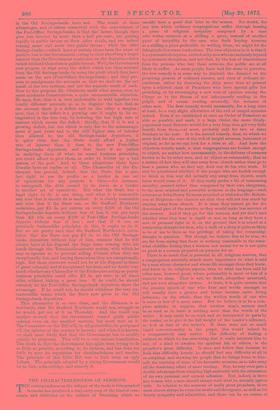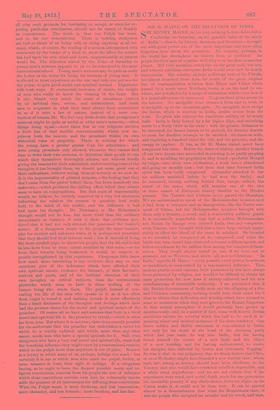THE CHARACTERLESSNESS OF SERMONS.
THE correspondence on the subject of the trade in lithographed Sermons has produced a very early crop of the kind of com- ments and criticisms on the subject of Preaching which we usually hear a good deal later in the season. No doubt, for any loss which ordinary congregations staffer through hearing a piece of religious insipidity composed by a man who writes sermons at a shilling a piece, instead of another piece of insipidity by the man who finds buying sermons at a shilling a piece preferable to writing them, we might let the lithographed-sermon trade alone. The true objection to it is that it is a systematicdeception, carried on by men who are seriously injured by systematic deception, and not that, by the loss of dissertations from the persons who buy these sermons, the public are at all likely to suffer. As most people have had the sense to perceive, the true remedy is in some way to diminish the demand on the preaching powers of ordinary curates, and even of ordinary in- cumbents, either by throwing the duty more than at present upon a selected class of Preachers who have special gifts for preaching, or by encouraging a new vein of opinion among the Clergy as to the fitness of not infrequently reading in the pulpit, and of course reading avowedly, the sermons of other men. The first remedy-would necessarily, for a long time at least, be a very alight alleviation of the evil of insipid sermons indeed. Even if we established at once an Order of Preachers as able as possible, and made it a large Order, the more thinly- populated rural districts would for a very long time get very little benefit from them,—at most, probably only for two or three Sundays in the year. It is the second remedy, -then,-to x.vhieh-we must look for the cure of the evil of insipid sermons, borrowed or original, so far as we can look for a cure at all. And here the objection usually made is that congregations are foolish enough to object, no matter how unreasonably. to the delivery of sermons known to be by other men, and to object so- vehemently, that as a matter of fact they will stay away from church rather than go to hear a parson who, as they say, does not do his own work. It may be questioned whether, if the people who are foolish enough to think in this way did actually stay away from church, much harm would come of it. If they really prefer a bit of unmeaning morality, penned rather than composed by their own clergyman, to the most original'and.powerful sermons in the language—such sermonsas John Henry Newman preached at Oxford or Mr. Robert- son at Brighton—the chances are that they will not lose much by staying away from church. It is clear they cannot go for the devotional part of the service, or they would make less account of the sermon. And if they go for the sermon, and yet don't care whether what they hear is vapid or not, so long as they have a sort of personal right in it, on the ground that it is mixed as a composing-draught for Them, why a walk or a sleep is quite as likely to be of use to them as the privilege of taking the composing- draught in question. But though we believe this to be true, we are far from saying that there is nothing reasonable in the some- what childlike feeling that a sermon not meant for us is not quite so good as a sermon prepared on purpose for us.
There is so much that is personal in all religious matters, that a congregation naturally attach more importance to what is said by a man whose character and whose life amongst them they know, and know in its religious aspects, than to what has been said by other men, however great, whose personality is more or less of a rumour to them. That is not, we think, altogether unnatural, and not even altogether unwise. At least, it is quite certain that the genuine speech of one who lives and works amongst us will usually have a greater and better because more living influence, on the whole, than the written words of one who is more or less of a mere name. But we believe it to be a com- plete mistake to suppose that another man's sermon need be so read as to leave it nothing more than the words of the writer. It may easily be so read, and so interpreted in parts by the reader, as to give it the full weight of the reader's influence, as well as that of the writer's. If there were not so much vapid conventionality in the pulpit, this would indeed be a comparatively easy matter. The difficulty of finding a subject on which he has something that it really interests him to say, of a kind to awaken the spiritual life of others, is the preacher's great difficulty. It does not follow that because he feels that difficulty keenly, he should feel any difficulty at all in so adopting, and showing his people that he brings home to him- self, the teaching of some of his favourite sermons, with take away all the deadening effect of mere reading. Nay, he may even gain a double advantage from mingling high authority with the attestation of his own personal and earnest adhesion. Nor, indeed, is there any reason why a man should always read what he actually agrees with. In relation to the sermons of really great preachers, there must almost always be room for doubt and divergence, as well as for hearty sympathy and admiration, and there can be no.reason at
all why such grounds for hesitating to accept, or even for re- ' jecting particular conclusions, should not be stated as frankly as concurrence. The truth is, that our Pulpit has been, and is, far too conventional. There is nothing clergymen are half so afraid of as being odd, or doing anything at all un- usual, which, of course, the reading of a sermon interspersed with comments by the reader of a kind to show the effect the sermon has had upon his own mind and heart, unquestionably at present would be. The objection stated by the Times of Saturday to young men's sermons appears to us to be conceived in the same conventional schooL Young men's sermons may be quite as easily the better as the worse for being the sermons of young men. It is absurd to treat experience as the one and only sine qua non for the power to give good moral and spiritual counseL Experience tells both ways. It enormously increases, of course, the insight of men who really do know the cunning of the heart. But it also blunts very much the sense of uneasiness excited by all habitual sins, errors, and artificialities, and leads men to acquiesce in what they have always been accustomed to as if it were a law of nature, instead of a mere con- vention of human life. We feel very little doubt that young men's sermons might be quite as useful as older men's sermons,—other things being equal,—were there but in our religious services a little less of that terrible conventionality which now im- prisons both the hearers and the preachers within its own whimsical rules of propriety. There is nothing for which the young have a greater genius than for admiration ; and were young preachers only allowed, whenever they cannot find time to write their own sermons, to introduce their people to one which they themselves thoroughly admire-, not without briefly giving the reasons for their admiration, and recounting some of the thoughts it has brought them, we should get some good out of their enthusiasm, without taxing them so severely as we now do. It is the impersonality of printed sermons,—the feeling that they don't come from the pastor before them, but from somebody else unknown,—which produces the chilling effect which they always seem to have on congregations. But that sense of impersonality would, we believe, be entirely removed by a very few sentences indicating the relation the sermon in question had really held to the mind of the reader, and the influence it had had upon his thought. Dr. Newman's or Mr. Robertson's thought would not be less, but more vivid than the ordinary incumbent's or curate's, if with it there was evidence pro- duced that it had not only entered, but possessed the reader's nature. If a clergyman seems to his people the mere conduit- pipe for another and unknown voice, it is perhaps not unnatural that they should feel their interest weak ; but if instead of being the mere conduit-pipe, he shows his people that the life and belief in him have been to some extent moulded by that voice,—so far from their interest being weakened, it would, we suspect, Jae greatly strengthened by that experience. Clergyman little know how much more interesting is any evidence they may on rare occasions give of the influences which have affected their own spiritual nature, evidence, for instance, of their favourite authors and poets, and of the habitual direction of their own thoughts on critical subjects, than the conventional platitudes which seem to have in them nothing of the human being who utters them. The pulpit, instead of con- cealing the life of the man who speaks in it, as it too often does, ought to reveal it, and nothing reveals it more effectively than a frank disclosure of the thoughts and feelings which have had the greatest charm for the moral and spiritual nature of the preacher. Of course all we have said assumes that there is a vivid moral and spiritual life in the preacher to reveal,—which is often far from true. But where it is not true, there is no remedy possible for the misfortune that the preacher has undertaken a career for which he is wholly unfitted, and which, more than any other career, needs men who have a special aptitude for it. Still, even clergymen who have a very real moral and spiritual life, waste half the beneficial influence they might exert by a conventional reserve, which in the pulpit more than anywhere is out of place. Reserve is a luxury in which many of us, perhaps, indulge too much ; but certainly it is one in which men who enter the pulpit, forfeit, in some measure at least, their right to indulge. If a clergyman having, as he ought to have, the deepest possible moral and re- ligious convictions, conceals from his people the sort of influence which these convictions exercise over him, he voluntarily throws aside the greatest of all instruments for diffusing these convictions. What the Pulpit wants is more freshness, and less convention ; more character, and less formula ; more freedom, and less fear.



































 Previous page
Previous page